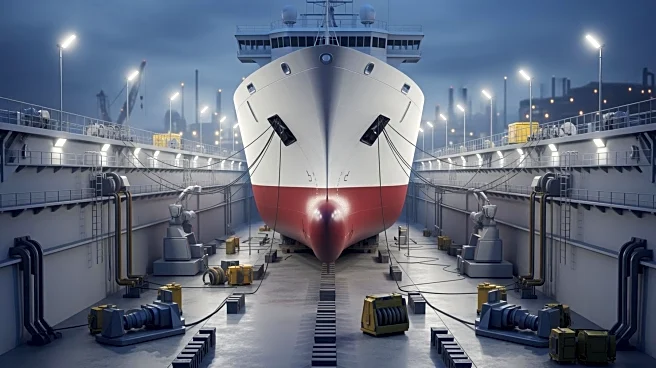What's Happening?
The U.S. ship repair industry is undergoing significant changes as it focuses on life extension and conversion projects to maintain competitiveness. This shift is driven by federal legislation, executive orders, and new foreign partnerships aimed at revitalizing
the maritime industry. Despite political confusion and challenges in building a robust supply chain, domestic projects are progressing. The industry is adapting to new cargo demands, such as biofuels and chemicals, and addressing the need for alternative fuels. A notable project involves the conversion of an existing petroleum barge to trade soft chemicals, highlighting the cost-effectiveness of life extension over new construction.
Why It's Important?
The focus on life extension and conversion in the U.S. ship repair industry is crucial for maintaining maritime superiority and supporting domestic markets. By extending the life of existing vessels, the industry can reduce costs and meet new cargo demands without the high capital expenditure of new builds. This approach also supports the U.S. Navy and Coast Guard by ensuring a capable domestic fleet. The industry's adaptation to new environmental regulations and alternative fuels is essential for compliance and competitiveness in global markets. The success of these projects could influence future policy and investment in U.S. maritime infrastructure.
What's Next?
The U.S. ship repair industry is expected to continue focusing on life extension and conversion projects. As geopolitical discussions evolve, there may be new legislation to support domestic manufacturing and supply chains. The industry will likely seek further foreign partnerships to enhance capabilities and address supply chain challenges. The success of current projects could lead to increased investment in similar initiatives, potentially influencing broader maritime policy and infrastructure development. Stakeholders will need to navigate political and economic uncertainties to capitalize on emerging opportunities.
Beyond the Headlines
The shift towards life extension and conversion in the U.S. ship repair industry highlights broader challenges in domestic manufacturing and supply chain development. The reliance on foreign materials and expertise underscores the need for strategic partnerships and policy support. The industry's adaptation to new environmental standards and alternative fuels reflects a growing emphasis on sustainability and compliance. These developments could lead to long-term shifts in maritime policy and investment, influencing the future of U.S. maritime infrastructure and competitiveness.















